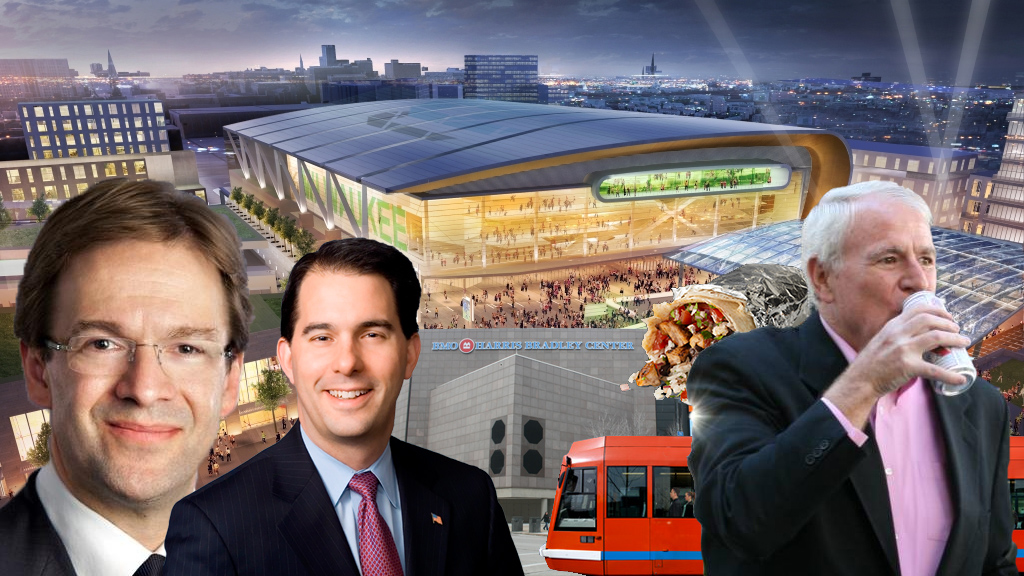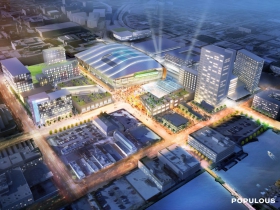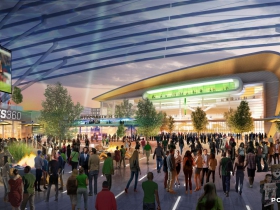Bucks Arena Winners and Losers
We count 33 winners, from strip clubs to Scott Walker to the streetcar, and 12 losers, including Frank Gimbel, the Brewers and Seattle.
The Wisconsin State Senate voted 21-10 yesterday in rare bipartisan fashion to pass a funding plan for the new Bucks arena. A compromise was reached that added a $2.00 a ticket tax, as well as eliminating the county’s use of certified debt as a contribution. The final deal puts the total public contribution at $250 million, excluding interest.
The arena deal still needs to pass the Wisconsin State Assembly, but passage there has always been a bit more straightforward. The deal is likely a go, even if the Assembly makes some changes. So who wins and who loses under this deal?
Winner: BMO Harris Bradley Center Haters
Yes, there were many of us. The “Fortress on Fourth,” as it’s been called, is an anti-urban monstrosity that does little or nothing to increase the value of the land around it. It was built for professional hockey and the sight lines and seating bowl configuration make that obvious, with too many seats far too high and a number of seats that don’t angle towards the basketball court. I’m forever grateful for the gift Jane Pettit gave to this state, but its time has passed and its demolition is a positive. Even if it costs more to attend games at a new arena, it may be worth it. I’ve been to a number of other NBA arenas and have yet to find one I like less that the BC.
Here’s hoping much of the building can be recycled, as was Northwestern Mutual‘s East Building.
Winner: Bruce Murphy
It’s no secret that our editor has created a cottage industry out of being critical of this deal. He’s consistently been the voice of the public, looking to protect taxpayers. That wouldn’t have been so noticeable had any other publication in town turned a more critical eye towards the deal. What is a secret is that Bruce is a huge NBA fan. He’s among the most excited people I know awaiting the chance to watch the trio of Giannis Antetokounmpo, Jabari Parker and Greg Monroe hit the the court together.
Winner: Chris Larson and Nikiya Harris Dodd
Milwaukee’s two youngest state senators, Chris Larson and Nikiya Harris Dodd had an impact, both voting for the deal, but only after exacting a compromise that eliminated the county debt certification. Unfortunately they still left the county with a $4 million a year bill. Interestingly, both senators used to be members of the county board.
They also managed to get a $2 ticket tax added, which is a big concession from the Bucks. Unfortunately the state negotiated to get 25 percent of the ticket tax, with the remainder going to the Wisconsin Center District. Still, the overall result reduces both the bite on taxpayers and the huge debt the district will have to issue, though the state’s portion of the ticket tax arguably should have gone to the county or district.
An added bonus for the senators? The arena will be built in Dodd’s district, but very close to Larson’s.
Loser: Cable Subscribers
The NBA’s new national television deal will kick in next year, sending league revenue through the roof. Once that’s distributed to all the teams, income tax collections in Wisconsin from Bucks players will soar. Unfortunately for Wisconsin residents, that increased revenue isn’t coming from a money tree. Every cable subscriber in Wisconsin will shoulder that burden, and would have continued to do so even if the Bucks left town, but they get at least some benefit in the form of Bucks players income tax payments to the state.
The money that flows to Bucks local cable affiliate FSN is peanuts compared to this national revenue.
Every cable subscriber is subsidizing the Bucks and NBA already, whether they watch a game or not.
Winner and Loser: Chris Abele
My only neutral rating for this column gets bestowed upon Milwaukee County Executive Chris Abele. He’s credited with shepherding the deal along, which would be a win, if not for the Senate Democrats removing his method of paying for the county’s share while leaving him with the bill. Abele also won himself more power, the sole authority over non-park land, in order to assure the county board couldn’t vote against his plan to hand the county’s Park East land to the Bucks for $1.
Winner: Common Ground
Common Ground had zero leverage in the arena debate, but attempted to get some by creating a campaign centered around getting money set aside for the countless dilapidated athletic facilities across Milwaukee. While that campaign ultimately failed, Milwaukee Mayor Tom Barrett did get part of the arena deal to include positive changes to how the foreclosure process works in Milwaukee County. Common Ground’s Bucks campaign has increased their visibility in the community, which may bolster their hard work on the foreclosure crisis still affecting Milwaukee.
Winner: Downtown Land and Business Owners
A major visitor destination, an NBA team, not only stays, but gets a new home. That should keep property values and visitor counts rising Downtown.
Winner: Downtown Taverns
That’s my take. Jake Dehne, co-owner of Upper 90 Sports Pub, Pub Club and Buckhead Saloon tells me that Old World Third St., where his bars and restaurants are located, is a winner in the deal. He’s probably right, because I’ll continue to go out before and after games, but I don’t see myself going to the chain bars that are likely to open in the “live district.”
For what it’s worth, I thought Kansas City Live, KC’s downtown bar block, was fun for a night. The Bucks’ “live district” is supposedly patterned after Kansas City Live (and other models). Unlike many corner bars in Milwaukee, Kansas City Live felt absolutely huge, regardless of where in the complex you went.
Kansas City Live had virtually no competition in the area, but that’s hardly the case here. Milwaukee has no shortage of bars and the ones that fare the best seem to be the ones in older buildings. It will be fascinating to see how opening a brand new building filled with bars and restaurants will work in Downtown Milwaukee.
Loser: Education
It’s embarrassing the amount of time we spend wrangling over some things while more serious issues go virtually unnoticed. For example, the Milwaukee Streetcar occupied so much head space while the Milwaukee County Transit System still heads for a cliff unless a dedicated funding source can be found. Similarly, the arena got debated extensively while a new state law on failing schools passed with virtually no fanfare. The new law will allow failing Milwaukee Public Schools to literally be removed from the district and placed under control of the county executive, with all of the employees at least temporarily losing their jobs. Regardless of how you feel about this law, it was passed with little coverage and discussion, while the Bucks arena got all the attention, yet the education law could have a far greater long-term impact on the community.
Loser: Franklyn Gimbel
Frank Gimbel, who has run the Wisconsin Center District ever since it was created, is on the outside looking in. He maintains his seat on the board for now, but has lost the chairmanship.
Winner: Haymarket Land Owners
The Haymarket neighborhood, also known as that collection of industrial buildings just north of Downtown, has been overlooked for years. It’s been cut off from the rest of Downtown first by an elevated freeway, and now a huge swath of vacant land. A large public housing complex to the immediate west certainly hasn’t aided property values either. All that’s set to change with a new arena and the planned development of the Park East. We’re already seeing more real estate activity in that area with National Ace Hardware at 1303 N. 4th St. being sold.
Winner: Herb Kohl
Herb Kohl, former US Senator and Milwaukee Bucks owner, comes away looking like a hero. He chipped in $100 million (tax free) to the new arena, which he made off of the profits from selling the team in the first place. In exchange he earns sainthood in Milwaukee for the rest of his life. Next time you see him at Ma Fischer’s or Sobelman’s thank him for not just taking the cash and retiring to Florida.
Loser: Joe Davis and Bob Donovan
Mayoral candidates and alderman Joe Davis, Sr. and Bob Donovan lose a wedge issue to use against Tom Barrett in the coming election. That and the Bucks said they want the streetcar extended to the arena.
Winner: Labor Unions and Building and Construction Companies
Lots of building and construction workers and companies will be needed to build the new arena and all the anticipated ancillary developments. Those jobs and business could be generated for years to come.
Winner: Local Media
The advertising dollars from the Milwaukee Bucks should keep flowing to the local media. As is the case in many markets, the local media went to bat for a taxpayer-funded stadium. Any connection there? You be the judge.
Loser: Major League Soccer in Milwaukee
The odds of Milwaukee getting a MLS team are now a bit darker. The loss of the Bucks might have created some momentum to land a team from the one professional sports league that is consistently adding new cities. That’s unfortunate in my book; I’ve had a lot of fun at MLS games in Chicago, Denver and Vancouver. Until the stars align, a once-a-year game at Miller Park between two foreign teams will have to suffice.
The Milwaukee Soccer Development Group will continue to push for a lower level professional team as well, an effort that has worked in other markets to eventually produce an MLS.
Winner: Marcus Corp.
Local hotel and movie giant Marcus Corp. is a clear winner in this deal. Where do the teams stay when they come to town? Almost always at the Marcus-owned Pfister Hotel. Win!
Also, for whatever it’s worth, I’ve heard stories of Giannis Antetokounmpo buying virtually every concession in sight at movie theaters, that can’t hurt.
Winner: Marquette University
Marquette will get a brand new arena and doesn’t have to pay for it. Plus the Bucks have agreed to be a tenant in the research and athletics facility the university is developing at N 8th St. and W. Michigan St. They might be the biggest winners besides the Bucks’ owners.
Winner: Metropolitan Milwaukee Association of Commerce
The MMAC went to bat big for the arena, stewarding the Play It Forward group that heavily promoted the new arena. The deal getting done will be another notch in the belts of Tim Sheehy and MMAC board members.
Loser: Milwaukee Admirals
All indications are that the Milwaukee Admirals minor league hockey team won’t be a part of the new arena. They’ll likely head to the UWM Panther Arena, where they played before moving to the BMO Harris Bradley Center when it opened.
Winner: Milwaukee Bucks owners
The team gets a brand new home to play in, along with a brand new practice facility. Win! They can charge more for tickets since sight lines and amenities will be better. Win! More money will come in from a new national television deal. Win! They came out of this having played the public relations game perfectly, with their reputation still held in the highest regard. Win! You get a brand new bar district in Downtown. Win!
The only downside for the ownership group is that they’ll shoulder the burden of any cost overruns. However, any cost overrun will likely be as a result of an improvement in their favor.
Winner: Milwaukee Bucks Fans
Fans of the Milwaukee Bucks will see a small amount of their tax dollars go to support the team they like. The team is increasingly putting a better product on the court, and the new ownership group led by Marc Lasry, Wes Edens and Jamie Dinan seems like they’re on the way to being one of the shrewdest in the league. Good times are ahead.
The only downside for Bucks is that new stadiums often come with ticket price increases, not to mention the ticket tax. But hey, fans won’t have to book a flight to Seattle to see Giannis and Jabari play.
Loser: Milwaukee Brewers
The bad news for the Milwaukee Brewers: Not only does a competitor for sponsorships, suites and club seats stay in town, but it will be selling a fancy new building. The Bucks also seem poised for success, while the Brewers are currently floundering, which could change how fans allocate their dollars in coming years. Fortunately for the Brewers, the still play home games in July and the Bucks still play in February. It doesn’t take much convincing to take the family trip to Milwaukee in the summer versus the winter.
Winner: Milwaukee Common Council
The city gets a new arena, and the council barely had to lift a finger. They’ll approve the tax-incremental financing district and move on with no significant budget impact.
Loser: Milwaukee County Board of Supervisors
Somehow in the middle of all the debate, and before the Board was even scheduled to become part-time in 2016, they lost more power. Abele got an anonymous legislator to tack an amendment onto the state budget that strips the board’s power in virtually all land sales.
Loser: Milwaukee County Residents
Residents of Milwaukee County will shoulder the major public costs of the arena with the smallest benefit. Sure, the new arena will be in Milwaukee, but the benefits in terms of income tax dollars flow to the state’s bottom line. The $4 million a year in state aid that the county is poised to lose is likely to mean cuts in services or higher property taxes. And county taxpayers also will pay much of the hotel, car rental and food tax levied by the Wisconsin Center District.
Winner: Milwaukee Streetcar
The Milwaukee Streetcar is oddly a winner in all of this because it will have somewhere to go west of the river. Currently, although engineering work to run it up N. 4th St. is underway, it’s been a bit tough to foresee how a route would work through the west side of Downtown. Now there is a demand generator in the form of a new arena, as well as substantial development planned in the Park East and underway at The Brewery. The streetcar can logically be extended past the new arena’s front door, up through the former Pabst Brewery and into the city’s Near West Side.
Winner: NBA Owners
NBA owners come out on top in this deal. The league gets a brand new arena and another generous public subsidy. More importantly, they maintain the blackmail chip of Seattle. Until a team is in Seattle, the value of every franchise is increased.
Winner: Out-State Residents
If you live in Wisconsin, but not in Milwaukee County, this arena deal is nothing but a win for you. The state government will continue to receive the income tax dollars from the team, scheduled to increase dramatically next year with a new NBA TV deal. In exchange for that increased flow, a small amount of the original revenue must be forfeited for arena bonding.
Winner: Paul Henning
Paul Henning goes from anonymous Bucks fan to face of the Save Our Bucks movement. It was a campaign Henning started two seasons ago when the team was plateaued under owner Herb Kohl’s playoffs or bust mantra. Henning’s group purchased a billboard near the BMO Harris Bradley Center that said “Winning Takes Balls,” a reference to the need to get lottery balls from having a poor record to get a star in the NBA draft. Little did Henning, or anyone else know, the Bucks would accidentally have the worst season in team history and end up with star-in-waiting Jabari Parker. New owners also stepped in at the end of the season and immediately injected life into Henning’s cause.
No one was more active in encouraging people to call their legislators in support of the arena deal. If the Bucks give him anything less than lifetime season tickets I’ll be disappointed.
Winner: Potawatomi Hotel and Casino, Strip Clubs, The Cheesecake Factory, Chipotle and PF Changs
It’s no secret that NBA players eat lots of food. Just look at their Instagram or Twitter feeds in the season. Bucks big man John Henson is even well-known for his love of Chipotle. The Cheesecake Factory, Chipotle and PF Changs are all known for their large portions, and will still see a steady stream of business from unusually tall customers with the Bucks staying in town.
Something you don’t see quite as often is the number of strip clubs and casinos NBA players visit. Trust me, many of them are regulars. Potawatomi and Silk Exotic are ready to ring the register.
Winner: Robin Vos
Assembly Speaker Robin Vos appears set to emerge completely unscathed from this deal. He managed to get the state to lower their contribution to the deal and appears likely to avoid a lengthy fight to get the bill passed in his legislative chamber. An added bonus is it looks like he has much greater control over his wing of the Capitol, compared to the wrangling it took in the Senate with Republicans jumping ship. Should he choose to run for Governor down the road, as has been rumored, he can use this in his stump speech.
Loser: Seattle
One of the country’s biggest basketball cities still doesn’t have a team. I’ll continue to call the Oklahoma City Thunder the Zombie Sonics, who, under new owners from Oklahoma City, abandoned Seattle in 2007. That said, I did think the name Seattle StarBucks was funny.
Winner: Scott Fitzgerald
I put Scott Fitzgerald in the win column by the slimmest of margins. He gets a clear win from the apolotical crowd for actually compromising with Democrats. Even some Republicans are likely happy that Democrats were forced to vote for it. Yet the Senate Majority Leader was unable to get the deal passed without a lot of fuss and delay that made him seem not quite in control of his delegation at times. On the other hand, he got a family victory: his brother Jeff successfully represented the Bucks as a lobbyist.
Winner: Scott Walker
Scott Walker, governor-turned-presidential candidate, originally proposed a deal that would have had the state bearing almost all the public cost for the deal, and which Republican legislators almost immediately ran away from. He got saved by Vos, Fitzgerald and Abele, who worked out a deal that transferred most of the costs to Milwaukee. Walker avoided the embarrassment of the Bucks leaving town while he campaigns, and got a deal that was much better for the state than he proposed.
Winner: State Government
The state has to give a little money to support bonding on the arena, but in return gets to keep all the income tax revenue flowing from the Bucks and visiting teams. The unique timing of the deal with regards to the NBA’s national TV deal means that the state will see a substantial increase in the amount of revenue they receive over the next couple years. With the arena being property tax exempt, the primary beneficiary of the arena is the state’s general fund. The deal is a win for the state’s bottom line while Milwaukee County and the Wisconsin Center District will eat most of the cost.
Winner: Tim Carpenter
State Senator Tim Carpenter (D-Milwaukee) gets a new arena in his city without having to vote for it. He’s actively running for the the Milwaukee Common Council seat last held by late Joe Dudzik and he’ll have a good talking point in one of the city’s most conservative districts.
Winner: Tom Barrett and the City of Milwaukee
Mayor Barrett and his negotiating team seem to have driven a hard bargain. Yes, they’ll build a new parking garage using tax-incremental financing, but they’ll get some of the revenue from it. They’ll also use TIF to tear down an existing parking garage, but it will be replaced by a new “live district” that from a layout perspective should better connect the land to the west with Old World Third St.
Their biggest coup might have come in making sure the “live district” pays property taxes, which previous state law all but insured it wouldn’t. This would have distorted the rules of the game when it came to bar and restaurant competition, and eliminated much of the benefit to the city of the new arena.
The Mayor also managed to get some laws changed related to the foreclosure process that will minimize its impact on the city and the community at large.
Reports from the state Senate chambers had Barrett upset about the ticket tax, because all of it didn’t go to the Wisconsin Center District to service their highly expensive debt.
The fight is far from over though, as the city, primarily through Rocky Marcoux and the Department of City Development must fight to insure the new development in the Park East is built in an urban, walkable fashion, in a way that knits it to the fabric of the city and assures the arena development doesn’t become an island in the middle of Downtown.
Winner: Urban Milwaukee
I’ll be honest with you, our Friday Photos column is likely going to feature arena, streetcar and Northwestern Mutual Tower and Commons construction photos for the next two years. It’s going to be a long time before Dave Reid and I look at each other and ask “what should we take photos of this week?
Winner: UWM Panther Arena
Sure its name seems to change almost as often as the Midwest-Frontier-Delta-Wisconsin convention center, but the UW-Milwaukee Panther Arena is the little engine arena that could. Opened in 1950, it’s still standing, while the adjacent BMO Harris Bradley Center will come down. It has a throwback charm to it, something that should be built upon, not scrubbed away by future renovations.
Come 2017, the arena will be home to the UWM men’s basketball team, the Milwaukee Admirals, Milwaukee Wave, and the Brew City Bruisers roller derby team.
Loser: Visit Milwaukee
The organization that tries to draw conventions to the city has long supported an expansion of the convention center, which looks much less likely since Wisconsin Center District taxes are tied up paying off the NBA arena for decades.
Winner: Westown
In urban planning and real estate development circles it’s commonly agreed that the west side of Downtown is plagued by “super blocks.” While trading one arena for another isn’t a remedy to that problem, plans to make the “live district” permeable to Old World Third St. are a definite improvement. The plans for the Park East land aren’t incredibly impressive yet, but they at least seem to avoid making the situation worse.
All of this is to say Westown wins because it avoids being overrun by a monstrous new arena complex. The scale of all the planned new buildings appears to be small enough to allow Westown to eventually be connected together by the same fine-grain urbanism that works so well in much of East Town.
Winner: Wisconsin Avenue
W. Wisconsin Ave. will be better off with the arena going where it is planned as opposed to the surface parking lot at W. Wisconsin Ave and N. 4th St. The scale of the arena would have overwhelmed the area, not because of its height, but because of its width. With the Shops of Grand Avenue next door, the mall and arena would have eliminated the grid of city streets at W. Wisconsin Ave. between N. 6th St. and N. 2nd St. The mall already is a barrier to development in the area, and the arena would have only made it worse.
Winner: Wisconsin Center District
True, the Wisconsin Center District won’t have the funds to expand the convention center as it’s wanted to do for years. But the ticket tax should at least significantly reduce the huge debt the district will have to issue. Without this, the payments on the bonds it issues wouldn’t have started for ten years. More importantly, the WCD gets more power: it now becomes this new super entity that is going to oversee a huge slice of downtown, including the Marcus Center for the Performing Arts, the new Bucks arena (nominally, as the Bucks will call the shots), the UWM Panther Arena, the Wisconsin Center and the Milwaukee Theatre.
Arena Renderings
If you think stories like this are important, become a member of Urban Milwaukee and help support real, independent journalism. Plus you get some cool added benefits.
More about the New Bucks Arena
- Murphy’s Law: Bucks Violating Promises on Unions? - Bruce Murphy - Jun 5th, 2025
- Back in the News: Bucks Owners Continue to Cash In - Bruce Murphy - Nov 28th, 2022
- Murphy’s Law: Bucks Subsidy An Issue in US Senate Race - Bruce Murphy - May 9th, 2022
- Murphy’s Law: Bucks Franchise Worth $1.86 Billion - Bruce Murphy - Jan 25th, 2021
- Op Ed: County Parks Lost Funding to Bucks Arena - Patricia Jursik - Jul 7th, 2020
- Eyes on Milwaukee: Fiserv Forum Workers to Get $15/Hour - Jeramey Jannene - Jan 29th, 2020
- Eyes on Milwaukee: Bucks Beat Hiring Targets on Fiserv Forum - Jeramey Jannene - Nov 20th, 2019
- Murphy’s Law: Taxpayers Make Bucks, Brewers Rich - Bruce Murphy - Apr 16th, 2019
- Eyes on Milwaukee: Bucks Unveil Master Plan for Park East - Jeramey Jannene - Mar 15th, 2019
- Eyes on Milwaukee: Bucks Plan Massive Arena Signs - Jeramey Jannene - Feb 12th, 2019
Read more about New Bucks Arena here
Eyes on Milwaukee
-
Church, Cupid Partner On Affordable Housing
 Dec 4th, 2023 by Jeramey Jannene
Dec 4th, 2023 by Jeramey Jannene
-
Downtown Building Sells For Nearly Twice Its Assessed Value
 Nov 12th, 2023 by Jeramey Jannene
Nov 12th, 2023 by Jeramey Jannene
-
Immigration Office Moving To 310W Building
 Oct 25th, 2023 by Jeramey Jannene
Oct 25th, 2023 by Jeramey Jannene

























Loser: Miller Park sales tax sunset I believe the 30-year lease for Miller Park will be up around 2030 which means somewhere around 2027 – just about 10 years after the Bucks arena opens – the Brewers will be coming around to the public asking for some type of major facility improvements in order to ensure long-term viability of MLB in Milwaukee and renewal of the lease. However, the Bucks arena will still be using all of the Wisconsin Center District tourism-related revenue for quite some time after 2030 and the local public will be very reluctant to enact anything new for the Brewers. Who knows what the Brewers will demand (video at every seat? complete roof replacement?) but I think it’s pretty certain that the Miller Park sales tax will be continued to keep them in Milwaukee.
Any commentator who thinks that a public that is about to pay $250 million for a highly profitable company owned in large part by “two New York-based hedge fund billionaires” is coming out on the winning side needs to have his head examined. The Wisconsin and Milwaukee public, like many other American taxpayers in other cities, are having the wool pulled over their collective eyes by economic development propoganda whose principal aim is to further enrich the rich and to further deprive the deprived. Sports boosterism aside (who really thinks Milwaukee’s basketball team is going to up and leave?), the impending passage of the Arena GIVEAWAY (let’s not call it a “plan) is a sad day for Milwaukee and a hypocritical day for a governor who claims that further taxing the public for any reason, including education, is a crime. But further taxing the public to further enrich hedge-fund billionaires is a win for the Wisconsin public? Seriously? But if Wisconsin residents want to further tax themselves to enrich billionaires and to further deprive the University of Wisconsin, I guess that’s their choice. After all, the Romans prioritized entertainment over education, and look where they ended up!
Have to slide Larson into the loser column for me. He mostly came out as a tentative “yes” on the deal for a while now but filed right into the ranks of the Dems once they had a meeting and decided they needed to form a bloc on concessions once their votes proved important. Suddenly, he comes out with the tough language against the county debt collection plan, going so far as to call it “heartless.” Once presented with a bill that doesn’t specifically name the debt collection as the means to pay for the county’s portion of the arena deal, Larson’s an across-the-board yes. When asked about the possibility (read:probability) that the Abele could still use the debt collection plan to fund the county’s $4M per year responsibility, Larson basically shrugged his shoulders, talking about the “optics” of not having language that guaranteed that in the bill. Basically, give me a way to look the other way on this and you’ve got my yes. After all, he was the “easiest” vote to get to a yes of the Dems, per his own words.
Absolutely no respect for that.
Labor Unions and Building and Construction Companies probably also slide to Loser or at least Neutral too. Much like how Education was a loser in that it didn’t get the public discussion volume that the arena got, the prevailing wage laws were also gutted during the budget passage.
Thanks for keeping the details on Barrett’s negotiation front-and-center. I was previously miffed about the parking garage issue, but seems they came at it from an urban fabric perspective and protected themselves on the property tax front.
Larson, rather than trying to lessen the huge quadruple tax burden his constituents will bear in this deal (city, county, state and WCD food-and-bev taxes) he staged gimmicky concern about which pot the county’s $4 million a year comes from. Yes, it’s a tad more out-front, but Abele gets to overrule–including over well-considered objections of the county’s elected comptroller and treasurer. Like Barrett, Larson cares about “optics” rather than reality. Winners indeed!
RE WCD: “More importantly, the WCD gets more power: it now becomes this new super entity that is going to oversee a huge slice of downtown, including the Marcus Center for the Performing Arts, the new Bucks arena (nominally, as the Bucks will call the shots), the UWM Panther Arena, the Wisconsin Center and the Milwaukee Theatre.”
It’s mystifying how all these WCD entities playing second, third, fourth fiddle to a Bucks-run arena district are going to give any of them more power–or any power at all–is beyond me. Marcus Center is a big fish in MKE’s pond but will be just another “liability” on the state’s long ledger of things politician would rather not be responsible for, along with all its state parks and some of its universities.
And no dreamed-of cultural sales tax, recently endorsed by a “now-enlightened MMAC prez” at a county board hearing, will be able to support a performing arts center now owned by the state (w/o new pretzel legislation). I’m not promoting privatization but if government wants to abdicate meaningful support, Maybe Marcus Center would be better off just being spun off as an independent nonprofit instead of a ward of the state. Marcus could protect its assets and not be a poor step-child with no connection to its NBA-controlled overlord.
BTW, the Legislature also as given Gov. Walker power to sell off much state property, but he’ll be too busy campaigning to worry about real estate in MKE. Stewarding state-owned public assets is no longer considered by many a function of government. Abele wants to dump Marcus but it’s got a dedicated base of supporters who will care much more about its future than either the county exec or political appointees on some new WCD board.
Rich,
Someone with a legal-eagle eye needs to check on the fine print on what property can actually be taxed. Maybe Bruce M will investigate, but the state bill seems to include only restaurants, not other retail. The bill does specifically exempt any sports merchandise stores, even outside the arena, which could be huge. It also seems to exempt any parking enterprise within a mile, as long as it’s somehow affiliated with the arena or the Bucks. Talk about an arena-sized loophole!
It is absurd to say that the Wisconsin Center District is a winner, when the deal trades away convention center expansion for the new arena. The district was created under Gov. Tommy Thompson for the expressed purpose of building, owning and operating a convention center. Now, this mission has been sacrificed on the altar of pro sports.
This represents a huge failure on the part of community leaders to grasp the genuine, documented value conventions bring to a city. In convention centers, deals are made and business gets done. They’re not as glamorous as sports and entertainment, but the ROI is far greater, and the math is simple: attendees come to town with pockets full of money and leave without it. Our elected officials should have found a way to do both; now Milwaukee won’t derive the full economic benefit of the new arena. The people of Milwaukee deserve better than leaders who are distracted by shiny objects.
Get the best bang for the Bucks! Move the Bucks back in NBA time, to Sheboygan!! More value, more history, more economic impact, more statewide team support (ala Green Bay!). Support the move to Sheboygan!! http://www.facebook.com/sheboyganbucks
@Urban Dweller
I agree 100%. Our officials (“leaders” may be an overstatement) are willing to sacrifice major civic institutions AND established small businesses on the altar of pro sports (and the Bucks entertainment chain mall). Cautionary research by economists and urban planners is pooh-poohed. The NBA/Bucks will be granted dominion over five major downtown institutions/performance venues–since they will control the new WCD as “anchor” venue. Downtown Milwaukee will be viewed as a mere satellite operation within the Visiting Venture Capitalists’ global holdings. We can watch the “Creative Destruction” of our city as our officials pass the buck and point fingers. Popcorn, anyone?
Only power broker Chris Abele can explain his Grand Vision for this new blood sport–but he’s not talking. The deal was apparently hatched 1) to provide a taxing stream to funnel to a new arena 2) to relieve Abele from having to steward another pesky “liability” (the Marcus Center). State legislators prevented his stealth provision in the budget bill to sell O’Donnell Park and put a target on MAM’s back, but he’s halfway to being able dump the Marcus. When did Abele start gunning for the arts?
“And county taxpayers also will pay much of the hotel, car rental and food tax levied by the Wisconsin Center District.”
Extremely unlikely given the patrons of hotels and rental cars (foreigners).
@GT – You definitely have a point with the hotel tax, but the other two taxes I pay plenty towards. Food and beverage we all pay when we go out to eat. Rental cars I personally encounter a couple times a year given that I split a single car with my fiancee. Next week she’ll also need to rent one while our car is repaired following an accident. Anytime I go to rent a car (always downtown, not at the airport) there is a line of locals waiting.
Another Winner: People Seeking Parking Near the Arena!
A MMAC-commissioned report by an MU professor on the Bucks proposed 30-acre Arena District says there are plans for 2,900 permanent parking spots in addition to other types of development (on p. 15). The City’s new $35-million ramp in Park East would include 1,243 spaces. Some would be for a proposed supermarket, but no word on other parking. That suggests at least one other monolithic ramp is planned.
http://www.scribd.com/doc/267115581/Arena-Impacts-Paper-by-Dr-Anthony-Pennington-Cross
Spot on, Urban Dweller. The WCD is a huge loser in this deal, having to do all of the work for their portion of the financing and getting absolutely nothing out of it, as well as being put in a position to try to figure out how to maintain the aging Marcus Center without any county support. The WCD is in essence being punished for having meticulously well maintained buildings and the Bucks rewarded for sucking the life out of their current home.
The Brewers are not losers. That’s shortsighted. The seasons don’t overlap much they compliment each other well. There isn’t a single city with just an MLB team as the major sport. Fans and more importantly businesses tend to budget more for sports, not less when there is a year round calendar. Sports fandom would have weakened significantly in the city by losing the bucks.
LOSER- CHRIS ABELE: If you’re playing poker and you don’t know who the sucker is at the table it’s probably you. Abele wanted to be a big player on this deal by pledging money he didn’t have (there’s a reason debts are uncollectible) and the State smartly said if you want to make this contribution we’ll cut your state aid instead.
WINNER- TOM BARRETT: The man who pulls the strings on Chris Abele saw Abele’s budget get a nice hole blown in it whilst barely putting up any direct city funds. He also manages to get the State to kick in money to the project. Interestingly the State did not kick into the Packers or Brewers stadiums and both of those teams are State teams. The Bucks simply aren’t.
LOSER- THE TAXPAYERS: Someday cities will wake up and realize they don’t have to subsidize insanely rich owners who have have insanely profitable businesses.
LOSER – EXISTING DOWNTOWN BUSINESSES: The purpose of a development like this is for the Bucks to capture as much of the revenue as is possible by people attending the games. This will impact the surrounding restaurants and bars who currently benefit from an arena.
@Mike –More reasons Chris Abele will be a BIG LOSER. He will also “own” putting a target on the backs of the WCD, Visit Milwaukee, and the Marcus Center for the Performing Arts, a board he sits on and used to chair.
He’ll also be the face of whatever happens–or doesn’t for years–on county Park East land. Getting to take over MPS schools and sell off county assets were his “rewards” from the state GOP for playing their sucker. He may soon want to go back to giving away family millions, which made him a darling.
MKE’s “LIVE” block/entertainment mall may be able to feed on the vitality of thriving blocks around it–but there will be winners and losers in this subsidized gamble…
An Ode of xfinity LIVE:
Philly’s New Dining & Entertainment District
by Nathaniel M. Hood
Silence builds along the six lane collector
Gray, concrete landscapes haunt fans and non-fans alike
Feeding either loneliness or drunkenness
A city stricken and destroyed
So here we are
So bold, so quiet, so expensive
Next to the Wells Fargo Center;
Home of the Flyers
Next to the Lincoln Financial Field;
Home of the Eagles
Next to the Citizen’s Bank Park;
Home of the Phillies
There is no sound but the buzzing of engines
This section of town has thrown in the towel
Sports, sports, sports, and valet parking
But one can dream of Super Bowl glory
Emptiness builds among the sea of parking
Welcome to the vapid landscape of nowhereness
Eating away every traditional urban thread
Xfinity Live, Philly’s New Dining & Entertainment District
The center of the world
Or the edge of the universe
Rarely anything in between
The only guarantee is convenient parking
http://nathanielhood.com/2015/07/19/philly-xfinitylive-poem/